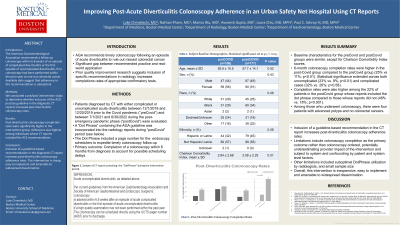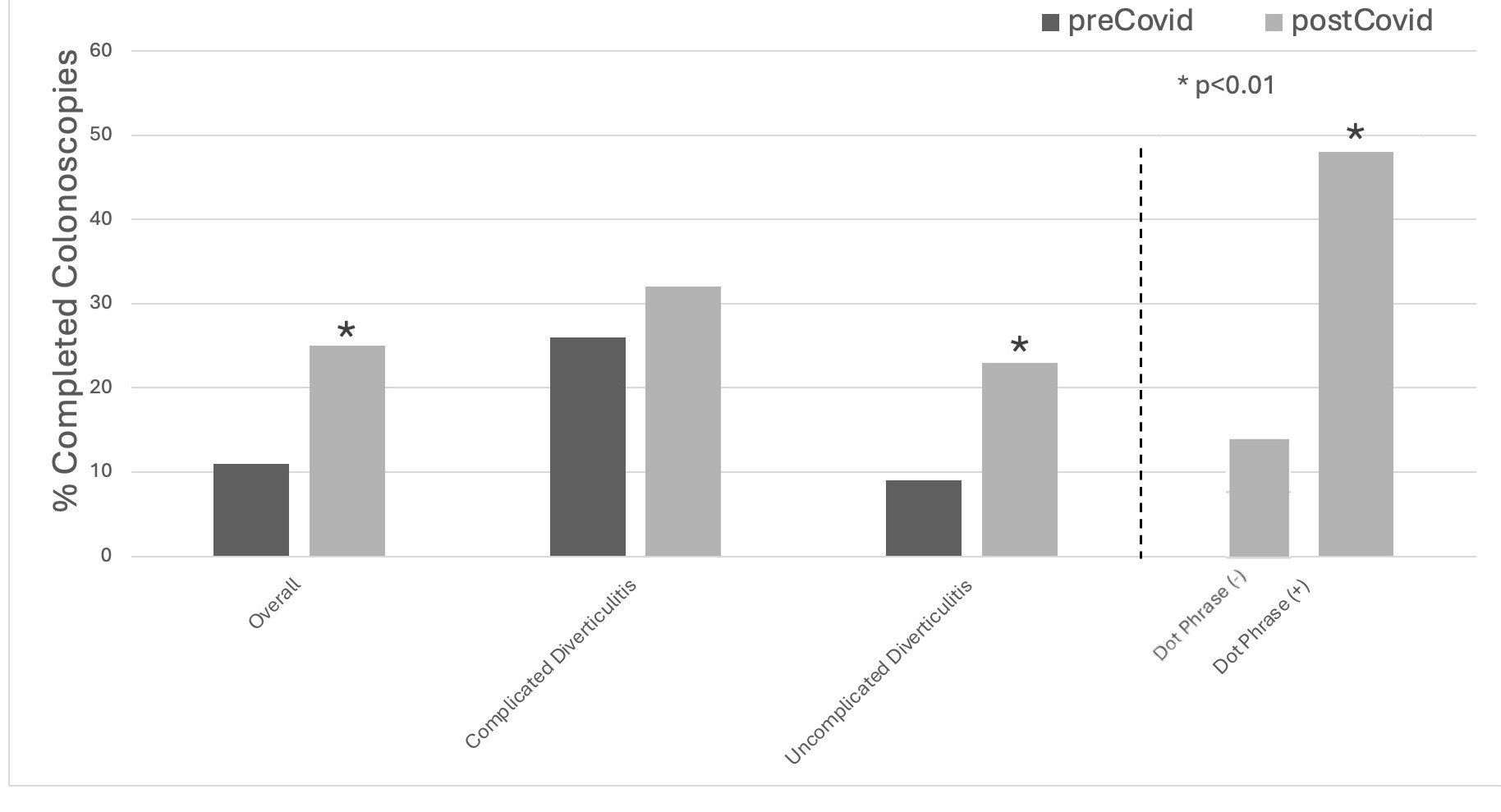Tuesday Poster Session
Category: Colon
P3652 - Improving Post-Acute Diverticulitis Colonoscopy Adherence in an Urban Safety Net Hospital Using Computed Tomography Reports
Tuesday, October 29, 2024
10:30 AM - 4:00 PM ET
Location: Exhibit Hall E

Has Audio
.jpg)
Luke Chmielecki, MD
Boston Medical Center, Boston University School of Medicine
Boston, MA
Presenting Author(s)
Luke Chmielecki, MD1, Marisa Wu, MD2, Nathan H. Pham, MD3, Avneesh Gupta, MD1, Laura Chiu, MD, MPH1, Paul C. Schroy, MD, MPH1
1Boston Medical Center, Boston University School of Medicine, Boston, MA; 2Boston Medical Center, Boston, MA; 3University of Washington, San Jose, CA
Introduction: Despite the recommendation for timely colonoscopy following an episode of acute diverticulitis to rule out missed colorectal cancer, a significant gap exists between recommended practice and real-world application. We aimed to determine if including the AGA’s current best practice guideline in the abdominal computed tomography (CT) scan report would increase post-diverticulitis colonoscopy completion rates.
Methods: Patients with either complicated or uncomplicated acute diverticulitis diagnosed by CT between 12/1/2018 and 12/20/2019 prior to the Covid pandemic (“preCovid”) and between 7/1/2021 and 6/30/2022 during the post-emergency pandemic phase (“postCovid”) were evaluated. During the postCovid phase, a “Dot Phrase” was added to the radiology reports of eligible patients, recommending a follow-up colonoscopy within 6-8 weeks after an episode of complicated diverticulitis or after the first episode of uncomplicated diverticulitis if no colonoscopy had been performed within the prior year. A protocol was developed whereby providers could page an endoscopy scheduler to expedite timely colonoscopy follow-up. The primary outcome was the completion of a colonoscopy within 6 months from diagnosis to account for possible scheduling delays.
Results: In the preCovid group there were 106 cases of acute diverticulitis, including 27 (25%) complicated cases and 79 (75%) uncomplicated. In contrast, the intervention postCovid group included 177 cases of acute diverticulitis, of which 38 (21%) were complicated and 139 (79%) uncomplicated. Overall, the 6-month colonoscopy completion rates were higher in the post-Covid group compared to the preCovid group (26% vs 12%; p< 0.01). This increase was seen in both uncomplicated cases (24% vs. 8%; p< 0.01), and complicated cases (32% vs. 22%; p=0.41), although the latter did not reach statistical significance. Completion rates were also higher among the 23% of patients in the postCovid group whose reports included the dot phrase compared to those whose reports did not (50% vs. 19%; p< 0.001). Among the 58 patients who underwent colonoscopy overall, 4 (6.89%) were found to have advanced polyps and none had colorectal cancer.
Discussion: This study demonstrates that inclusion of a guideline-based recommendation in the CT report increases post-diverticulitis colonoscopy adherence rates. The intervention is cheap, easy to implement and amenable to widespread dissemination. Adoption by radiologists is a major challenge to overall effectiveness.

Disclosures:
Luke Chmielecki, MD1, Marisa Wu, MD2, Nathan H. Pham, MD3, Avneesh Gupta, MD1, Laura Chiu, MD, MPH1, Paul C. Schroy, MD, MPH1. P3652 - Improving Post-Acute Diverticulitis Colonoscopy Adherence in an Urban Safety Net Hospital Using Computed Tomography Reports, ACG 2024 Annual Scientific Meeting Abstracts. Philadelphia, PA: American College of Gastroenterology.
1Boston Medical Center, Boston University School of Medicine, Boston, MA; 2Boston Medical Center, Boston, MA; 3University of Washington, San Jose, CA
Introduction: Despite the recommendation for timely colonoscopy following an episode of acute diverticulitis to rule out missed colorectal cancer, a significant gap exists between recommended practice and real-world application. We aimed to determine if including the AGA’s current best practice guideline in the abdominal computed tomography (CT) scan report would increase post-diverticulitis colonoscopy completion rates.
Methods: Patients with either complicated or uncomplicated acute diverticulitis diagnosed by CT between 12/1/2018 and 12/20/2019 prior to the Covid pandemic (“preCovid”) and between 7/1/2021 and 6/30/2022 during the post-emergency pandemic phase (“postCovid”) were evaluated. During the postCovid phase, a “Dot Phrase” was added to the radiology reports of eligible patients, recommending a follow-up colonoscopy within 6-8 weeks after an episode of complicated diverticulitis or after the first episode of uncomplicated diverticulitis if no colonoscopy had been performed within the prior year. A protocol was developed whereby providers could page an endoscopy scheduler to expedite timely colonoscopy follow-up. The primary outcome was the completion of a colonoscopy within 6 months from diagnosis to account for possible scheduling delays.
Results: In the preCovid group there were 106 cases of acute diverticulitis, including 27 (25%) complicated cases and 79 (75%) uncomplicated. In contrast, the intervention postCovid group included 177 cases of acute diverticulitis, of which 38 (21%) were complicated and 139 (79%) uncomplicated. Overall, the 6-month colonoscopy completion rates were higher in the post-Covid group compared to the preCovid group (26% vs 12%; p< 0.01). This increase was seen in both uncomplicated cases (24% vs. 8%; p< 0.01), and complicated cases (32% vs. 22%; p=0.41), although the latter did not reach statistical significance. Completion rates were also higher among the 23% of patients in the postCovid group whose reports included the dot phrase compared to those whose reports did not (50% vs. 19%; p< 0.001). Among the 58 patients who underwent colonoscopy overall, 4 (6.89%) were found to have advanced polyps and none had colorectal cancer.
Discussion: This study demonstrates that inclusion of a guideline-based recommendation in the CT report increases post-diverticulitis colonoscopy adherence rates. The intervention is cheap, easy to implement and amenable to widespread dissemination. Adoption by radiologists is a major challenge to overall effectiveness.

Figure: Post-Diverticulitis Colonoscopy Rates
Disclosures:
Luke Chmielecki indicated no relevant financial relationships.
Marisa Wu indicated no relevant financial relationships.
Nathan Pham indicated no relevant financial relationships.
Avneesh Gupta: Philips Healthcare – Speakers Bureau.
Laura Chiu indicated no relevant financial relationships.
Paul Schroy: Guardant Health, Inc – Advisory Committee/Board Member.
Luke Chmielecki, MD1, Marisa Wu, MD2, Nathan H. Pham, MD3, Avneesh Gupta, MD1, Laura Chiu, MD, MPH1, Paul C. Schroy, MD, MPH1. P3652 - Improving Post-Acute Diverticulitis Colonoscopy Adherence in an Urban Safety Net Hospital Using Computed Tomography Reports, ACG 2024 Annual Scientific Meeting Abstracts. Philadelphia, PA: American College of Gastroenterology.
